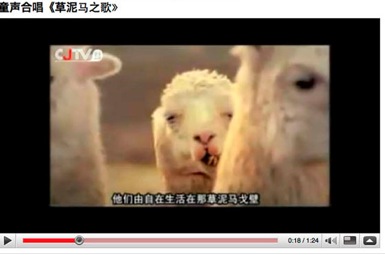« Manufacturing your bogus Wikipedia story on Wikipedia | Home | I'll admit it, 24 is good again »
March 13, 2009

Chinese bloggers too dirty for the NY Times

The Times reports on a new internet phenomenon in China -- cheeky bloggers are writing stories and making cartoons and videos about an animal called a "grass-mud horse" in fake nature documentaries and children's songs [video example--it's actually an alpaca].
The grass-mud horse is an "impish protest" against the Chinese government's censorship of the internet, says the Times, because the characters that form its name are a homonym for something dirty: "The mythical creature whose name, in Chinese, sounds very much like an especially vile obscenity."
But this is the Times, a respectable family newspaper, so they won't tell you what that obscenity is -- sort of ironic for an article that's overtly critical of media censorship.
Slate, on the other hand, doesn't care about propriety, so they'll just come right and tell you that the Mandarin for "grass-mud horse", cao ni ma, is a homonym for "fuck your mother." (London's Times seems to be the first to report the actual phrase.)
The Slate article goes on to explore the "motherfucker" insult, which seems to exist globally as the worst insult anyone has been able to come up with. We get some funny and super-vulgar variations of the theme in African, Asian, Mediterranean, and Arabic cultures, with a little anecdote about the first written example in English, in a Texas court in 1889, where someone who was called that particular insult who then shot his insulter "could not be found guilty of a higher offense than manslaughter."
These subversive Chinese online writers seem to have thwarted government censors for now. Censorship has gotten a lot worse recently: in the last couple of months, the government has shut down about 2,000 websites for publishing material they don't like. The NY Times quotes Wang Xiaofeng, a blogger in Beijing, who wrote about the grass-mud horse phenomenon as a sign of censorship's inability to control free expression: "When people have emotions or feelings they want to express, they need a space or channel. It is like a water flow — if you block one direction, it flows to other directions, or overflows. There’s got to be an outlet."
Thanks to the London Times and Slate for providing an outlet for the mf'ing flow around the NY Times Manual of Style and Usage.
Here's an essay from the NY Times' Public Editor from last summer, around the time of the Jesse Jackson "I wanna cut his nuts off" incident, about when the paper decides to use crude language, which is just about never.
categories:
International, Media, Politics
posted by amy at 5:54 PM | #
Trackback Pings
TrackBack URL for this entry:
http://amysrobot.amyinnewyork.com/mt/mt-tb.cgi/946
